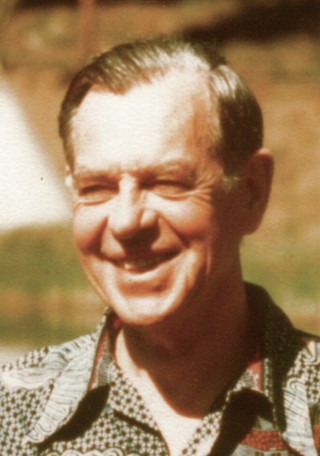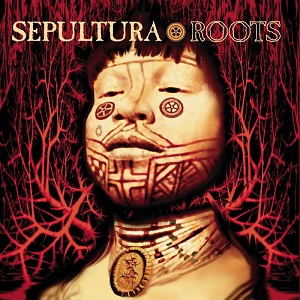
Joseph John Campbell was an American writer. He was a professor of literature at Sarah Lawrence College who worked in comparative mythology and comparative religion. His work covers many aspects of the human experience. Campbell's best-known work is his book The Hero with a Thousand Faces (1949), in which he discusses his theory of the journey of the archetypal hero shared by world mythologies, termed the monomyth.

Roots is the sixth studio album by Brazilian heavy metal band Sepultura. It was released in Europe on February 20, 1996 and in the U.S. three weeks later on March 12 by Roadrunner Records. It is the band's last studio album to feature founding member and vocalist/rhythm guitarist Max Cavalera.
Ecosophy or ecophilosophy is a philosophy of ecological harmony or equilibrium. The term was coined by the French post-structuralist philosopher and psychoanalyst Félix Guattari and the Norwegian father of deep ecology, Arne Næss.
KCET is a secondary PBS member television station in Los Angeles, California, United States. It is owned by the Public Media Group of Southern California alongside the market's primary PBS member, Huntington Beach–licensed KOCE-TV. The two stations share studios at The Pointe in Burbank; KCET's transmitter is located atop Mount Wilson in the San Gabriel Mountains.
The Xavante language is an Akuwẽ language spoken by the Xavante people in the area surrounding Eastern Mato Grosso, Brazil. The Xavante language is unusual in its phonology, its ergative object–agent–verb word order, and its use of honorary and endearment terms in its morphology.

The Power of Myth is a book based on the 1988 PBS documentary Joseph Campbell and the Power of Myth. The documentary was originally broadcast as six one-hour conversations between mythologist Joseph Campbell (1904–1987) and journalist Bill Moyers. It remains one of the most popular series in the history of American public television.
A millennium is 1000 years.

Peter John Kreeft is a professor of philosophy at Boston College and The King's College. A convert to Roman Catholicism, he is the author of over eighty books on Christian philosophy, theology and apologetics. He also formulated, together with Ronald K. Tacelli, Twenty Arguments for the Existence of God in their Handbook of Christian Apologetics.
Bruce Parry is an English documentarian, indigenous rights advocate, author, explorer, trek leader and former Royal Marines commando officer. He employs an ethnographic style and a form of participant observation for his documentaries.
David Henry Peter Maybury-Lewis was a British anthropologist, ethnologist of lowland South America, activist for indigenous peoples' human rights, and professor emeritus of Harvard University.
Bride service has traditionally been portrayed in the anthropological literature as the service rendered by the bridegroom to a bride's family as a bride price or part of one. Bride service and bride wealth models frame anthropological discussions of kinship in many regions of the world.

Victor Sarin is an Indian-born Canadian/American film director, producer and screenwriter. His work as a cinematographer includes Partition, Margaret's Museum, Whale Music, Nowhere to Hide, Norman's Awesome Experience, and Riel. He also directed such projects as Partition, Left Behind, and Wind at My Back.
The Academy of Canadian Cinema & Television's 7th Gemini Awards were held in March 1993 to honour achievements in Canadian television. The awards show took place at the Metro Toronto Convention Centre and was broadcast on CBC Television.
Jamie Christopher Shannon is a Canadian actor, best known for his work in the Canadian television series Nanalan', as well as Ooh, Aah & You, and the Canadian-American television series Mr. Meaty.

Heather Elizabeth Apple is a Canadian writer, artist, and educator, with an interest in organic horticulture. She was awarded a 125th Anniversary of the Confederation of Canada Medal in 1992.
Michael Anthony Boland is a Canadian cinematographer and former professional ice hockey player. He played two NHL games with the Philadelphia Flyers during the 1974–75 season and also played 41 WHA games with the Ottawa Nationals, before beginning to work as a television and documentary film camera operator.
David A. Crocker, is Research Professor in the School of Public Policy, at the University of Maryland, he is also the founder and former president of the International Development Ethics Association (IDEA). His work has been cited by the United Nations Human Development Report.

Disappearing World is a British documentary television series produced by Granada Television, which produced 49 episodes between 1970 and 1993. The episodes, each an hour long, focus on a specific human community around the world, usually but not always a traditional tribal group.

Seven Worlds, One Planet is a television documentary series from the BBC Natural History Unit. The seven-part series, in which each episode focuses on one continent, debuted on 27 October 2019 and is narrated and presented by naturalist Sir David Attenborough. Over 1,500 people worked on the series, which was filmed over 1,794 days, with 92 shoots across 41 countries.
Qallunaat! Why White People Are Funny is a 2006 satirical documentary film directed by Mark Sandiford and Zebedee Nungak. The documentary-style film reverses the roles between White Canadians and the Inuit of Northern Canada, highlighting the nature of the treatment of the Inuit by White Canadian society.







